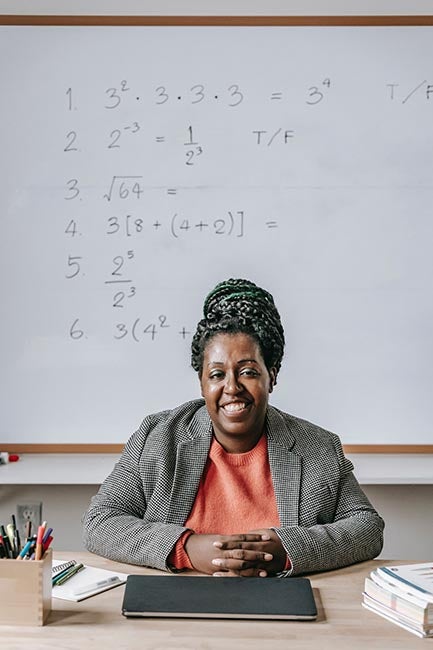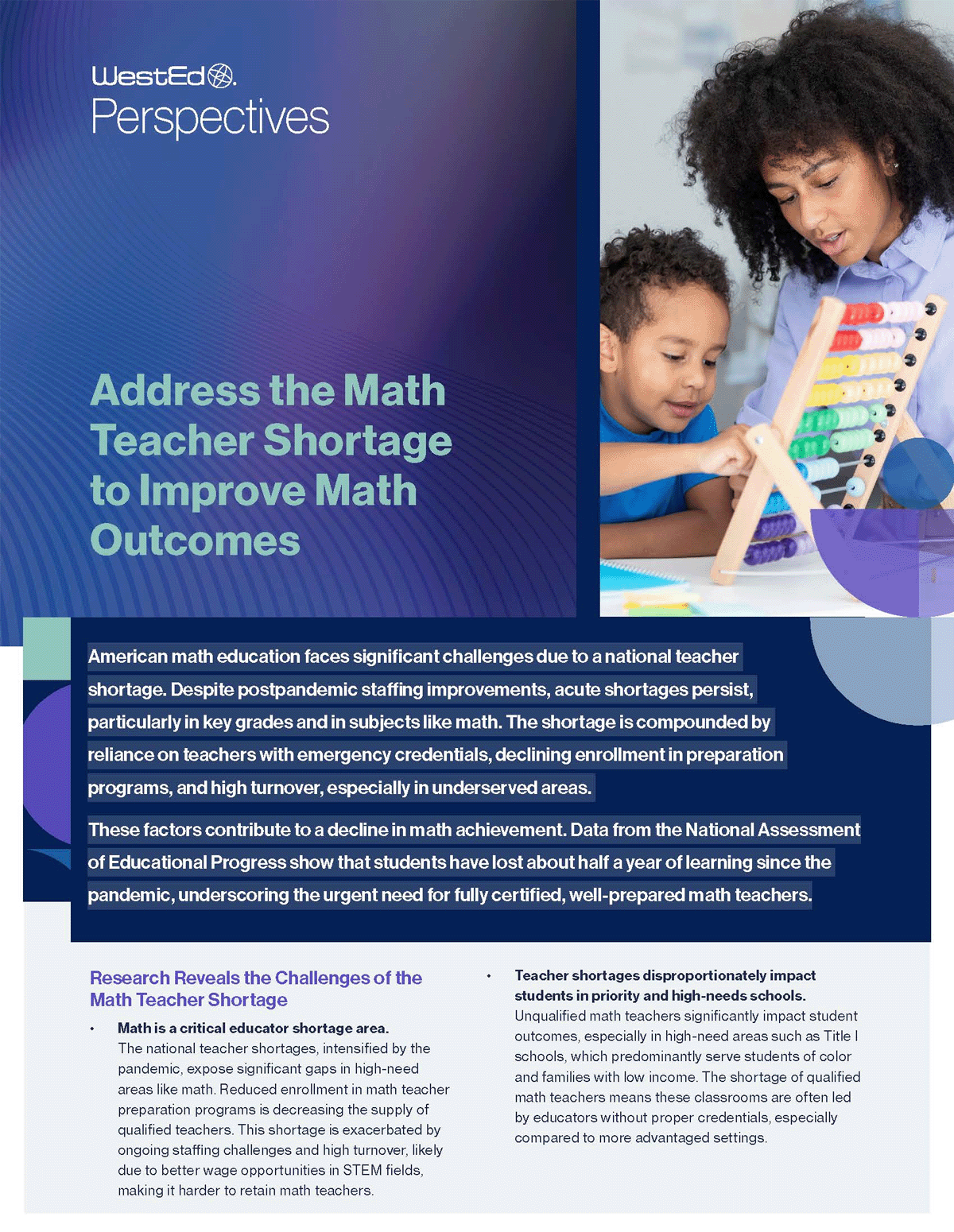Everything About Certified Mathematics Educators: Their Role in Fostering Trainee Growth and Accomplishment in Mathematics Education
Qualified math instructors are essential in forming trainees' understanding and appreciation of maths. Their deep knowledge and effective mentor strategies can greatly affect pupil outcomes. These instructors not only impart mathematical abilities but additionally promote a comprehensive atmosphere that meets varied discovering needs. As they take on cutting-edge techniques, the concern occurs: exactly how do these methods especially enhance student engagement and accomplishment in mathematics?
The Relevance of Certified Mathematics Teachers in Education
Although lots of factors add to student success in mathematics, the visibility of qualified mathematics educators stands out as a crucial aspect in cultivating reliable understanding environments. Research regularly suggests that students shown by instructors with solid mathematical histories have a tendency to demonstrate greater degrees of understanding and accomplishment. Certified math teachers not just have a deep understanding of mathematical ideas yet likewise the pedagogical abilities needed to convey complex concepts in easily accessible ways. They can recognize students' specific requirements and adapt their mentor methods accordingly, advertising inclusivity and involvement. On top of that, their expertise enables them to create a favorable classroom atmosphere that motivates risk-taking and resilience in problem-solving. This helpful atmosphere fosters a development attitude amongst students, improving their confidence and motivation in maths. On the whole, certified mathematics educators play an essential duty in forming pupils' attitudes towards math, ultimately influencing their future opportunities and academic trajectories.
Secret High Qualities of Effective Math Educators
Reliable math educators possess numerous essential qualities that enhance their teaching performance. These include deep subject understanding, solid communication abilities, and flexible teaching techniques that provide to varied understanding needs. Acknowledging and cultivating these qualities can substantially affect pupil understanding and engagement in maths.
Deep Topic Expertise
While a solid pedagogical strategy is essential, deep subject knowledge continues to be a foundation of reliable mathematics instructors. Such expertise allows educators to understand mathematical concepts thoroughly and to expect pupil misunderstandings. Educators with a strong grasp of math not only supply material with confidence however additionally link numerous subjects, promoting a richer discovering atmosphere. They are outfitted to apply diverse training techniques that deal with various learning designs, making complicated ideas extra accessible. Deep subject expertise equips educators to involve in purposeful discussions with pupils, motivating crucial reasoning and analytic abilities. Eventually, the deepness of comprehending that math educators have greatly affects students' scholastic growth and success in mathematics, laying a solid foundation for future discovering.

Solid Communication Skills
Deep subject expertise alone is insufficient for cultivating an effective knowing environment in mathematics; solid interaction skills are equally vital for effective math teachers. These skills enable instructors to share intricate ideas in accessible ways, making certain that students comprehend foundational ideas. Effective interaction includes not only clarity yet likewise the ability to proactively pay attention, encouraging student participation and dealing with misconceptions. By fostering an open discussion, educators develop a helpful classroom ambience where pupils really feel comfortable asking concerns and revealing their ideas. In addition, strong communicators can adjust their language and explanations to match diverse understanding designs, enhancing student interaction and understanding. Inevitably, effective interaction bridges the gap between an instructor's knowledge and a trainee's understanding, greatly influencing academic success in mathematics.
Adaptive Mentor Approaches
A selection of flexible mentor techniques are vital for efficient math teachers aiming to satisfy the varied demands of their students. These techniques make it possible for teachers to tailor their direction based on specific knowing capabilities, rate of interests, and designs. qualified math teachers. Methods such as differentiated direction, where instructors customize item, web content, or procedure, aid address differing efficiency levels. Additionally, including modern technology and interactive devices can improve engagement and facilitate tailored understanding experiences. Formative analyses enable teachers to check development and change training methods accordingly. Joint group work advertises peer knowing, promoting a helpful setting. By employing these flexible methods, mathematics teachers can develop inclusive classrooms that encourage all trainees to prosper and attain their academic goals, ultimately promoting a love for maths
Innovative Training Approaches Used by Math Teachers
As teachers seek to involve pupils much more properly, innovative training approaches have actually emerged as a prime focus in math classrooms. These approaches intend to enhance understanding and retention of mathematical concepts. One popular approach is using innovation, such as interactive software program and online simulations, which permits students to visualize complicated troubles and obtain prompt feedback.Additionally, project-based understanding encourages cooperation and real-world application of math principles, cultivating critical thinking skills. Gamification, where math concepts are incorporated into game-like settings, has actually likewise obtained appeal, making finding out more satisfying and motivating for students.Moreover, differentiated direction dressmakers lessons to fit differing ability levels, making certain that all pupils can progress at their own speed. By employing these cutting-edge methods, mathematics educators create dynamic understanding experiences, inevitably advertising higher pupil growth and success in maths.
Producing Inclusive Discovering Settings
Producing inclusive knowing settings in maths education includes carrying out diverse discovering strategies and promoting collective team tasks. These techniques satisfy the diverse demands of pupils, making sure that everyone has the chance to be successful and engage. By focusing on inclusivity, math educators can cultivate a class atmosphere that sustains all learners.
Diverse Discovering Strategies
While many teachers venture to foster comprehensive learning settings, carrying out diverse knowing techniques is essential for successfully getting to all trainees. These techniques incorporate a series of mentor methods tailored to accommodate differing discovering backgrounds, designs, and abilities. For example, incorporating visual help, manipulatives, and innovation can involve pupils who may struggle with standard guideline. Additionally, separated instruction allows teachers to change assessments and projects, making certain that every student can access the curriculum at their own degree. Culturally responsive pedagogy likewise plays a substantial role in acknowledging and valuing the varied experiences of pupils, thereby boosting their link to the product. By using these varied learning strategies, certified mathematics instructors can produce a supportive ambience where all pupils are equipped to do well in mathematics.
Collaborative Group Activities

The Effect of Professional Math Teachers on Student Success
The existence of certified mathematics educators substantially affects trainee accomplishment, as efficient direction can connect voids in understanding and cultivate a favorable understanding setting. Research study shows that pupils educated by experienced educators show higher levels of efficiency in mathematical concepts compared to their peers. Certified math educators possess a deep understanding of mathematical web content, allowing them to existing material in varied methods that provide to numerous finding out designs. This versatility not only boosts understanding yet also improves student confidence in their abilities.Moreover, qualified educators often employ developmental assessments to keep track of trainee progression, permitting prompt treatments when needed. Their ability to create appealing lessons encourages pupil involvement and promotes a development mindset. Therefore, the effect of certified math educators extends beyond mere scholastic efficiency; it cultivates a feeling of interest and strength in students, ultimately causing boosted results in maths and a more powerful foundation for future discovering.
Approaches for Involving Pupils in Mathematics
Involving pupils in math calls for a diverse strategy that includes varied strategies to catch their interest and improve understanding. One reliable method is the usage of real-world applications, permitting students to see the importance of mathematical concepts in daily life. Including innovation, such as interactive software application and on-line sources, can also promote interaction by offering vibrant knowing experiences.Group work motivates partnership, allowing pupils to gain from each other and establish problem-solving skills in an encouraging setting. In addition, integrating games and hands-on tasks can make finding out more pleasurable and accessible.Differentiated instruction deals with numerous learning styles, guaranteeing that all trainees can get in touch with the product. Providing prompt comments assists trainees recognize their progression and areas for improvement, cultivating a growth mindset. By employing these strategies, instructors can create an interesting math class that advertises student development and achievement.
The Role of Specialist Advancement in Enhancing Math Training Abilities
While numerous teachers identify the value of effective training approaches, expert development plays a necessary function in enhancing math training abilities (qualified math teachers). Constant training possibilities allow educators to remain current with pedagogical developments, mathematical content, and technological tools. Workshops and seminars offer discussion forums for instructors to collaborate, share finest methods, and talk about challenges they encounter in the classroom.Furthermore, specialist growth cultivates a growth state of mind amongst teachers, motivating them to review their methods and adapt their techniques based upon trainee demands. This ongoing understanding process not only boosts teachers' mathematical understanding yet additionally equips them with ingenious educational strategies that can cause improved student interaction and achievement.Ultimately, an organized professional advancement program can substantially influence the quality of mathematics education and learning, making certain that educators are well-prepared to influence and lead their pupils towards success in maths
Frequently Asked Concerns
What Credentials Are Essential to Come To Be a Mathematics Instructor?
To come to be a mathematics educator, people typically need a bachelor's degree in mathematics or education, teaching certification, and a strong understanding of mathematical principles. Added qualifications might include specialized training in pedagogy and classroom management abilities.

How Do Math Educators Assess Trainee Progress in the Class?
Math instructors evaluate trainee progression with different techniques, consisting visit the site of examinations, jobs, and tests (qualified math teachers). They likewise utilize observational analyses and pupil involvement to assess understanding, adjusting guideline based upon individual and team efficiency to boost discovering outcomes
What Obstacles Do Math Educators Frequently Face?
Mathematics educators frequently encounter obstacles such as differing trainee skill degrees, restricted resources, educational program restraints, and the demand to involve trainees effectively. Additionally, they frequently experience pressure to enhance standardized examination ratings and take care of class behavior.
Just How Can Moms And Dads Support Their Child's Math Education and learning?
Parents can sustain their youngster's mathematics education by supplying a conducive discovering environment, participating in math-related activities, urging a positive perspective towards challenges, and maintaining open interaction with teachers to keep an eye on progress and address concerns.
What Resources Are Readily Available for Mathematics Teachers to Improve Their Abilities?
Various sources are offered for mathematics instructors, consisting of on-line training courses, professional advancement workshops, peer cooperation groups, educational websites, and click this link mentor journals. These devices improve training strategies, deepen subject understanding, and ultimately enhance pupil knowing outcomes in mathematics. Qualified math instructors are vital in forming pupils' understanding and gratitude of mathematics. Lots of variables contribute to pupil success in mathematics, the visibility of certified math instructors stands out as a crucial aspect in promoting efficient knowing settings. In addition, certified mathematics teachers help with these communications by tactically organizing pupils, making sure that each group contains a mix of ability degrees and histories. The existence of certified math educators substantially influences student success, as efficient instruction can link spaces in understanding and promote a favorable discovering setting. Math educators generally face obstacles such as varying pupil ability degrees, limited resources, curriculum restraints, and the requirement to involve pupils efficiently.